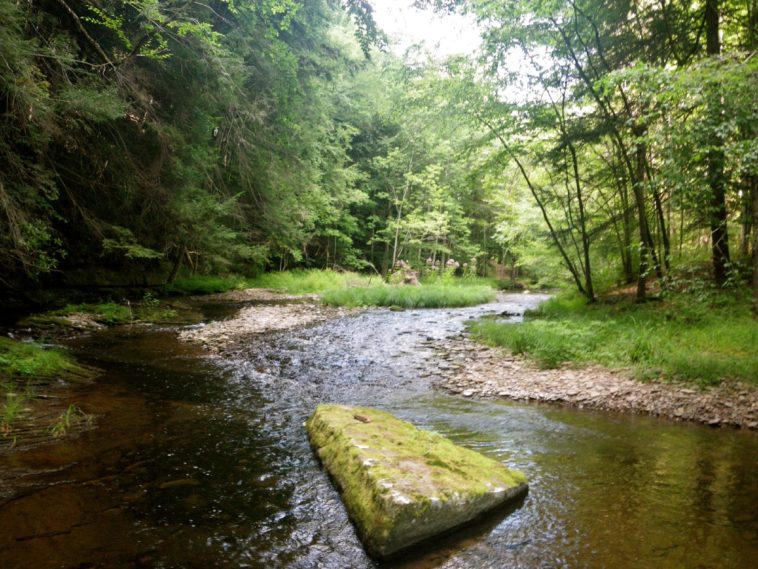h2>Dating : William’s Fish
The clouds were just beginning to collect in the western sky when I picked Will up from the Anne Arundel Hospital Center, a massive collection of light brown brick buildings that just off of Route 50 near Annapolis. Despite the impending storm, you could still feel the sun, and there was no wind yet, so the air sat heavy and thick — enough to make you sweat in the shade.
Will walked from the automatic double doors of the hospital wearing khaki shorts and a grey t-shirt that had St. Mark’s Football printed on it in block letters. He made the cheap shirt looked as if it had been tailored — it stretched over his broad shoulders and hugged his biceps as they moved back and forth while he strode toward the truck with his head down. His hat was cocked back on top of his long, wavy hair that fell past his square and suntanned jaw. He stared at the ground in front of his feet as he walked.
“How’s he doing?” I asked, keeping my eyes straight ahead through windshield. Will settled into the truck. I threw him a can straight dip and he pulled a bottle from under the seat. It was a quarter full of brown liquid. He packed the dip into his lip, opened the bottle, and spit into it, mingling his fresh tobacco saliva with the stale and pungent soup that had been festering in the bottle.
“Sorry I don’t have another spitter,” I said.
“It’s cool man, thanks.”
He looked out of the window towards a grove of trees surrounding a drainage ditch next to the highway. “He’s not doing good.” He took his hat off and threw it on the dash. “Doctors said they won’t really know much till tomorrow.”
He looked at me for a second when he said this, and then his eyes retuned to the grove of trees.
“Yea?” I said. I didn’t know what else to say.
“I don’t know what the hell happened. I just… ” he stopped.
“You still wanna go fishing?” I asked.
“Yup.”
“I was thinking we would just hit up the drainage pond on Belair Drive. We could save some time with the rain coming in and all,” I said as I put my truck into drive and pulled away from the hospital entrance. I hit the brakes suddenly when a car backed out of its spot unexpectedly, and Will jumped in his seat, spilling the bottle on his lap. The thick, chunky, dip-spit showed a hint of red on his shorts. I pretended I didn’t see what happened. I started scanning stations on the radio.
“I’d rather go down to the river. I like it better down there. I don’t really care if we get rained on.” His hands were shaking as he spoke.
We drove from the hospital with the windows down. The summer air filled the small cabin of the truck as we rolled down the highway, passing the green soy fields, faded red barns, and lonesome farmhouses. The rushing wind felt good and its noise made the ride loud enough that neither one of us felt the need to talk. Our eyes were given a break from the sun every few minutes by the gathering clouds.
I exited the highway, and drove through the housing developments, and small clusters of commerce. Then those suburban roads turned to country roads, and we traveled in silence, winding through blind turns, and rolling over up lazy short hills with overhanging trees that brushed the roof of the truck.
It was not long before the skeleton of the old Bowie Racetrack appeared. It had once been a significant racing spot on the east coast, but now, after decades without use, it was just a rickety grandstand fending for itself against the wind and sun. The orange trim was falling from the green structure, and the windows near the betting booths were all broken.
It was surrounded by signs that read keep out, no parking, and no trespassing, and, as any decent fisherman knows, a no trespassing sign near water just means that the fishing is good. The racetrack offered the best parking near the Patuxent River corridor — a slithering snake of untouched land stretching through the thick maze of suburban sprawl. A rugged place, a quiet river full of wild fish where those types of things are scarce.
I slowed down to make sure no one was there before I turned into the abandoned lot.
“You see anyone?” I asked Will.
“Nope. We’re good,” he said without looking.
“Remember that crazy guy the first time we came out here?” I asked.
We were in my mother’s green minivan, inching through the old parking lot, searching for a hidden place to leave the vehicle when an old, skinny man with leather skin, came up behind us in a John Deere Gator. I panicked and drove into a ditch, getting both front tires stuck and bending the bumper. The man rode right up to the window and blew smoke in my face.
“Get the hell out of here, and don’t come back,” he said. Then he drove around the side of the grandstand. We never saw him again, even though we parked there many times since.
Will did not respond to my question, and the gravel crunched under my tires. We rolled beyond on the old parking lot into the dirt and went down a steep hill covered with tall brown grass — the tips of the blades ran along my arm as I hung it out of the window. I parked behind the some bushes, out of sight from the road.
Will and I emerged from the truck and went about the business of preparing our tackle. We sat in silence on the tailgate and threaded fishing line through the eyelets of the rods. I tied a spinner on while Will arranged his rig with a salted flipping tube.
“You only catch little ones with spinners. If you want bigguns, use the tubes.”
Will said this every time, and he usually laughed, but that day he kept a strait face and his eyes fixed in the distance, towards the river that was flowing beyond the trees. He spun the line over itself a few times and pulled the knot tight with his teeth. I forced a smile and looked away. We both rose, surrounded by the quite of the field, and we walked towards the green line of trees— sliding through the waist-high grass.
We knew every snake’s nest and groundhog’s hole, and we did not stumble once. We normally rushed across the open field — seeking the ease and coolness of the shaded path under the green leaves in the woods. But Will kept his slow pace; taking each step as if to not disturb a single blade of grass.
Once in the trees we followed the path through a marshy area where the stagnant water was ankle deep in the low spots. I avoided these puddles by cutting through the thorns and vines that grew on the side of the path. Will never changed course, walking right through the muddy water. The clouds were trailing us, and they were dark now, but Will didn’t seem to notice.
At a small clearing where the land was raised and dry he stopped and spoke for the first time since leaving the truck. “I was going out to get beer.” He looked right at me when he said this and I could see his bloodshot eyes.
“What? When?” I asked.
“That night,“ he replied. “My little brother is in the hospital because of me.”
I fooled with my fishing reel a little to hide my curiosity. “It was an accident. I mean, what happened?” I asked.
“Everyone thinks I was drunk. My parents won’t even talk to me. The police were asking me about it.” He squatted down to pick up a small twig. He tried to throw it off the path, but it was too light, and it just landed right next to him.
I didn’t want to, but I asked, “Were you drunk?”
“You too?”
“I was just asking.”
“No. We had just bought the beer.”
“I didn’t think you were.” I said.
“Now you know.”
“Then it wasn’t your fault.”
“It was though. I picked him up from baseball practice, and he didn’t want to stop. He had a game the next day and didn’t want to drink. But, I went anyway.”
“You couldn’t of known.”
“If we hadn’t gone that way, none of this would have happened. I wouldn’t of even been at that light.”
“You can say that about any decision you ever made. That it could have been different another way. You don’t know what would have happened if you went right home.”
“I bet my brother wouldn’t be hooked up to fifteen machines right now. He wouldn’t have had a car door mashed into his head. His face was caved in.” He squeezed his fishing pole so hard when he said this that the cork on the handle cracked. “His baseball hat has goddamned blood all over it. I had to throw it in the trash last night.”
There was a long silence, and I couldn’t think of anything to say. “He’ll pull through.”
Will’s hands stayed tight on the fishing rod and he said, “You don’t know that. That’s just what you are supposed to say.”
“He will.”
“Well, if he doesn’t, I won’t.”
We stayed in that spot until Will said, “Let’s get down to the river before the rain. They don’t bite as much once it starts raining.” He started walking before I replied.
We continued down the path, and a little before the edge of the river the trees opened up, and soil was firm and packed by years of footsteps. The air smelled like swamp-mud and flowers mixed together, and there were fresh and rusted beer cans on the ground and some food wrappers that the wind had not picked up yet. The light and shadows danced as the breeze moved the trees and the spot was beautiful despite the carelessness of people.
We approached the river. The bank was elevated an arm’s length above the surface and a big oak grew there. Its roots stuck out into the river like fingers trying to pick fish from the moving water.
As we stood in the clearing the first distant roll of thunder broke the silence, and we noticed two men were stumbling away from the bank downstream with their tackle boxes and rods in hand.
“Y’all boys best be gettin’ out of here before the rain gits ya,” the first one said with a slight slur in his speech. He looked too old to have to be drinking down by the river. His jean shorts were a little too tight and his tennis shoes had holes in them. He wore a cut off Gun’s and Roses shirt that showed the faded tattoos coving his arm. He tossed a lit cigarette butt at my feet when he walked by.
The second man was younger and heavier, and he was finishing off a Busch Light as he walked past. He crumpled the can and threw it into the bushes. Then they both disappeared like disturbed snakes into the brush.
“Assholes,” Will said softly.`
We both saw where the two had been sitting. The ground was littered with cigarette butts, food wrappers, and about twenty empty beer cans.
There were also six largemouth bass lined up on the ground next to each other. Their bodies were motionless, and their shallow dark pupils, surrounded by light yellow, were fixed in place.
I kicked the trash and said, “God damn it. I can’t stand people like that. Why would anyone do that?”
Will bent down over the fish and poked each one, looking for movement and life.
“They’re dead,” I said. “A damn waste.”
“I think the gills are still moving,” he said.
I looked upward. The wind had rushed in as the sky turned dark grey. The air flow turned the leaves up, exposing their dull green underside. The rain was coming down now.
Will picked up the smallest fish and leaned down over the steep bank and put it back into the river, pulling it back and forth through the cool water, trying to force oxygen into the gills. The winds increased and the rain was heavy now — falling fast in large, cold drops that smacked hard on the ground. Will was getting mud all over himself as he made his way down the line of fish.
But each one he let go just turned its white belly up and floated like a piece of wood down the river. After the fifth one I said, “Come on man, get up. It’s not gonna do anything.”
He looked at me. His tears were mixing with the rain, and he said, “I gotta do something.”
Then he leaned over the edge with his head just above the surface, and he dropped the last fish into the dark water of the Patuxent River.




